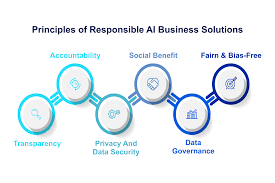Eps 27: AI Governance and Regulation: Paving the Way for Responsible AI
In the 10-minute podcast titled "AI Governance and Regulation: Paving the Way for Responsible AI," the discussion revolves around the importance of implementing governance and regulation to ensure responsible use of artificial intelligence (AI) technologies. The podcast highlights that while AI has the potential to bring about positive changes in various industries, it also raises concerns regarding its ethical implications and potential risks. Therefore, it is crucial to establish proper governance measures to mitigate these risks and ensure that AI is developed and deployed responsibly. The podcast explores different aspects of AI governance and regulation, starting with the need for transparency and accountability in AI systems. It emphasizes that organizations should be able to provide explanations for AI decision-making processes to build trust and avoid biases or discrimination. The podcast also touches upon the importance of human oversight in AI systems. While AI can automate various tasks, humans need to have the ability to intervene and override decisions made by AI. This human-AI collaboration is crucial to prevent any unintended negative consequences. Furthermore, the podcast addresses the need for comprehensive regulations to address the ethical implications of AI. It suggests that industry-wide standards should be developed to ensure responsible AI development, deployment, and usage. These regulations would help prevent unethical use of AI technologies and protect individuals' rights and privacy. Lastly, the podcast stresses the significance of multi-stakeholder engagement in AI governance and regulation. It advocates for the involvement of diverse groups, including policymakers, industry experts, academics, and civil society, to collectively develop and implement AI regulations that consider different perspectives. Overall, the podcast emphasizes the necessity of governance and regulation to pave the way for responsible AI. It asserts that by implementing comprehensive regulations, promoting transparency, ensuring human oversight, and engaging various stakeholders, we can harness the potential of AI while mitigating its risks and ensuring ethical practices.
| Seed data: | Link 1 |
|---|---|
| Host image: | StyleGAN neural net |
| Content creation: | GPT-3.5, |
Host

Jonathan Ruiz
Podcast Content
Introduction:
In recent years, artificial intelligence (AI) has emerged as a transformative technology with the potential to revolutionize various industries, from healthcare to finance. As AI becomes more prevalent and sophisticated, it is crucial to establish proper governance and regulation frameworks to ensure its responsible development and use. This podcast examines the importance of AI governance and regulation, discussing the challenges, benefits, and potential strategies for creating an environment that promotes responsible AI.
Challenges in AI Governance and Regulation:
The rapid advancement of AI technology poses numerous challenges for governance and regulation. One major concern is the potential biases that AI systems can develop due to the data they are trained on. If these biases go unnoticed and unchecked, they can perpetuate discriminatory practices or produce unfair outcomes, especially in critical areas such as criminal justice or hiring processes. Additionally, the lack of transparency and interpretability in many AI algorithms makes it challenging to understand and correct these biases. Striking the right balance between innovation and ethical considerations is another challenge. Stricter regulation might stifle innovation and slow down progress, while insufficient regulation can lead to unethical or harmful applications of AI.
Benefits of AI Governance and Regulation:
Despite these challenges, there are significant benefits to implementing AI governance and regulation. Firstly, it enhances accountability and trust in AI systems. Transparency requirements and regulatory oversight ensure that AI developers and users are held accountable for the decisions made by AI models and algorithms. This fosters public trust and improves the acceptance of AI in society. Secondly, AI governance and regulation can help mitigate the risks associated with biased algorithms. By establishing guidelines and standards for fairness, regulators can ensure that AI systems are designed and trained to minimize discriminatory outcomes. Thirdly, regulation can promote the adoption and use of AI technology in a responsible and ethical manner. It provides a framework to address concerns like privacy, security, and the economic impact of AI, allowing organizations to navigate these complex issues with clarity and consensus.
Strategies for Responsible AI Governance and Regulation:
To pave the way for responsible AI, several strategies can be employed in governance and regulation frameworks. First and foremost, collaboration among various stakeholders is crucial. Governments, industry leaders, researchers, and civil society organizations need to come together to develop comprehensive guidelines and standards. This collaborative approach ensures that diverse perspectives are considered, enabling the creation of balanced and effective regulations. Secondly, continuous monitoring and evaluation of AI systems must be implemented. Regular audits and assessments help detect biases, discriminatory patterns, or unintended consequences, allowing prompt adjustments and improvements. Thirdly, transparency and explainability should be prioritized. AI algorithms should be designed in ways that enable humans to understand their decision-making process. This transparency also empowers regulators to assess and address any ethical or legal concerns related to AI systems.
Conclusion:
AI governance and regulation play a critical role in shaping the future of artificial intelligence. By addressing the challenges, promoting its benefits, and employing effective strategies, we can create an environment where responsible AI flourishes. Establishing guidelines and standards that prioritize fairness, transparency, and accountability is key to building trust and ensuring the ethical development and use of AI. With responsible governance and regulation, we can unlock the full potential of AI while mitigating the risks it may pose, leading to a brighter and more inclusive future powered by this transformative technology.
